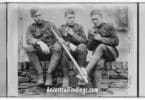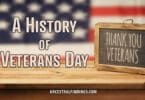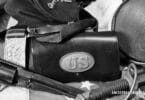With the one hundred year anniversary of WWI, it is an interesting project to research your ancestors’ WWI history. Whether it is a direct ancestor, or a collateral relative, collecting and preserving the stories of those who served in what was then known as the “Great War,” is a worthwhile endeavor. These are all stories that need and deserve to be told, as everyone involved was a hero in their own way. If you are interested in or curious about the history of your WWI ancestor while they served, this is the way to research it.
The first thing to remember is that WWI records have not been prioritized by the federal government. It is only with the advent of the centennial anniversary of it that some kind of effort has started to be made to collect all available WWI records into one location that is easy to access for researchers. This means your ancestor’s WWI records may be in many different locations right now. Many researchers looking for military records give up when they discover that a fire in 1973 at the National Archives Records Personnel Center in St. Louis, MO destroyed 80 percent of army personnel records from 1912 to 1960. This should be no discouragement to you because the records of WWI are in so many other places.
The best place to get started looking is at home, with your own relatives. It is not out of the question that you may have personally known someone who served in WWI or know someone who knew that person well. Talk to your relatives and discover what is already known in the family about any members who served in WWI. You may want to research one or all of them if more than one person served. Because the war was only a century ago, and people connected to the soldiers are still surviving, there is a good chance some of their WWI memorabilia may have been preserved. There may be diaries or letters home by the soldier, photos of them in uniform, or even military medals that still exist within your family.
And, just because many of the service records of WWI army personnel were destroyed in the 1973 fire does not mean your family did not keep their own copies of those records. I have a copy of my great-grandfather’s WWI discharge papers… something that was destroyed in its original form in the 1973 disaster… because he saved them, and my great-grandmother kept them after he was gone. When she was gone, they came to me. I didn’t need the records lost in the fire because of this. You might not, either.
Also, if your ancestor served in the Navy (there was no Air Force then), their records may still be completely intact elsewhere, in another government repository. The fire only affected army personnel records. Remember that as you search.
Once you have gotten all of the information you can from your family, use that as a jumping off point to look elsewhere, to places where you may find even more records and/or information.
One of the most popular resources for WWI records right now is available online at Ancestry.com (for a membership fee) and at FamilySearch.org (for free). This is the database of WWI draft registration cards. These cards don’t provide a service history because they were generated before the person went into service (if they actually ever did, since these are just draft registration cards). However, they can tell you quite a bit about your ancestor at the time of the draft, at the beginning of the war, including what their personal and family situations were like. Also, most veterans of the war who enlisted prior to the draft are not included in this database. Still, if you find your ancestor in it, you can find the following information:
- Their date of birth
- Their place of birth
- Their occupation at the time of the draft
- Their employer’s address at the time of the draft
- Their personal address at the time of the draft
- Their closest relative (someone who will always know their address)
- Whether they are married or have any children, and how many children
- A physical description of them, including hair color, eye color, and build
- Whether they have any physical disabilities
- Their signature
Ancestry.com also has an excellent database called “US Headstone Applications for Military Veterans, 1925-1963.” This is a database of requests for free government-issued headstones for veterans, some going back to previously unmarked graves for Revolutionary and Civil War soldiers requested during this time period. If you find your WWI ancestor’s name in the database, the request card will have their name, rank, unit, dates of service, and dates of birth and death, as well as the name of the relative who requested the stone, and their address.
The Fold3.com website has a database of US Veterans Administration Pension Payment Cards for pension payments made between 1907 and 1933 to members of the regular army and Navy (not draftees). You can discover whether your ancestor was granted a pension, on what grounds, when they served, where (what unit) they served, and how much their pension payment was.
Local newspaper archives may have articles on your WWI ancestor either during their service or after their return. Local and county courthouses may have military paperwork that returning veterans filed there for safekeeping, including discharge papers that may otherwise have been ruined in 1973 in St. Louis. State Adjutant General offices usually have records of those serving in the National Guard, so if that is where your WWI ancestor served, you may find records of them there.
You can also check the National Archives in St. Louis to see if your ancestor’s records were among the 20 percent that was not ruined in 1973, or if they are the ones that have been restored over the years. The National Archives in Kansas City, MO has medical records and final payment vouchers for WWI military personnel of both the Navy and Army.
As you can see, there are plenty of places you can look for your WWI ancestor’s military records, and begin piecing together the story of their military history. It is a worthwhile endeavor. If you are looking for a new genealogy project to start, or to just find out more about a particular ancestor, this is an excellent thing to do, and will greatly enrich your family history and tree.






